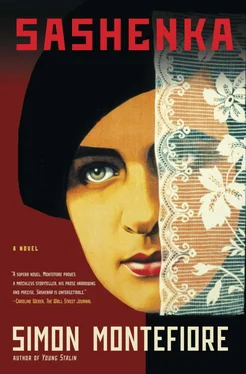Spring was a glory in Tiflis, magical Tiflis in Georgia, Tiflis the capital of the Caucasus, midway between the Zeitlin oil wells in Baku, on the Caspian Sea, and the Zeitlin oil tankers in Batum, on the Black Sea.
There the Zeitlins rented the mansion of a penniless Georgian prince, on a cobbled lane nestled into the steep slopes of Holy Mountain. Russian colonels and Armenian millionaires called at the house. Ariadna greeted them, laughing under her breath, from among the vines on the balcony, her hungry white teeth and violet eyes glistening. She never visited the nursery.
“Lewis and child are coming with the baggage” was her line. But even though he was so busy, Zeitlin would drop in on the nursery. He seemed to prefer it to Ariadna’s “at homes” full of officers and bureaucrats in frock coats and top hats, sashes and shoulder boards. In the highest circles, children were to be admired briefly and then removed from sight, but Zeitlin adored his Sashenka and kissed her forehead again and again.
“I must go back to work,” he’d say. “But you’re so sweet, darling Sashenka. Your skin is like rich satin! You’re good enough to eat!”
One day, during a rare evening off work, Lala dressed in her Sunday best and a parasol and promenaded down the main avenue, past the white Viceroy’s Palace (where, she’d heard, Ariadna had shocked the officers’ wives with her bare shoulders and her frenzied dancing). The Tiflis streets smelled of lilac and lily of the valley. She passed theaters, opera houses and mansions on her way to Yerevan Square.
She’d been warned to be careful of the square and she soon realized why. The noisy, filthy side streets seethed with Turks, Persians, Georgians and mountain tribesmen in the brightest and wildest costumes, wielding daggers and blunderbusses. Urchins or kintos scampered through the crowds. Water sellers and porters pushed wheelbarrows. Officers walked their ladies but there were no women on their own. Barely had Lala stepped into the square when she was surrounded by a mob of urchins and salesmen, shouting in their own languages, all offering their wares—carpets, watermelons, pumpkin seeds and lobio beans. A fight broke out between a Persian water seller and a Georgian urchin; a Chechen drew a dagger. It was early evening and still boiling hot. Jostled and harassed, with sweat pouring down her face, Lala was afraid. Then, just as she began to panic, the crowd parted and she found herself being pulled into a phaeton.
“Mrs. Lewis,” said Samuil Zeitlin, in an English blazer and white trousers, “you’re brave but silly venturing out here on your own. Would you like to see the Armenian bazaar? It’s not safe for a lady on her own but it’s most exotic: would you join me?” She noticed he carried a cane with a wolf’s head.
“Thank you, but I should be getting back to Sashenka.”
“It’s a joy to me, Mrs. Lewis, that you so treasure my only child but she’ll be fine with Shifra for an hour,” said her master. “Are you all right? Then let’s stroll. You’ll be safe with me.”
Zeitlin helped her down from the phaeton and they plunged into the wild crowd. Urchins offered Georgian snacks, Persians in fezzes poured water from wineskins; Russian officers in jodhpurs and gold-buttoned tunics strode past; Circassian tribesmen with sabers and coats with pouches for bullets dismounted from their tough ponies. The sounds of hawkers shouting, “Cool water, over here!” and the smells of fresh bread, cooking vegetables and heaps of spices were intoxicating.
Zeitlin showed her the steep alleyways and dark corners of the bazaar where bakers baked flat Georgian lavashi , Armenians displayed kindjal daggers and silver-chased saddles, Tatars sold sherbet prepared by their veiled women in back rooms, stopping sometimes to kneel on Persian carpets to pray to Allah, and a Mountain Jew played a hurdy-gurdy. As they walked, she put her hand through Zeitlin’s arm: it seemed only natural. In a little café behind a stall selling spices, he bought her an iced sherbet and a glass of Georgian white wine that was stone cold, fruity, slightly sparkling.
It was dusk. The warm streets, steaming with the smells of hot Georgian cheesecake— khachapuri —and Armenian shashlik lamb, and reverberating with the laughter of women from balconies and the clip of horses on the cobbles, were still crowded and mysterious. Men brushed against her in the shadows. The wine made her head spin a little.
She dabbed her forehead with her handkerchief. “Perhaps we should go home now.”
“But I haven’t shown you old Tiflis yet,” he said, leading her down the hill, through tiny winding streets of crumbling houses with leaning balconies embraced by ancient vines. No one else was out in these streets and it was as if Zeitlin and she had stepped out of real life.
He opened an old gate, using a chunky key. A watchman with a spade-shaped white beard appeared and gave him a lantern. They were in a lost garden, draped in rich vines and honeysuckle that breathed out a heady perfume.
“I’m going to buy this house,” said Zeitlin. “Doesn’t it remind you of a Gothic novel?”
“Yes, yes,” she said, laughing. “It makes me think of ghostly women in white gowns…What was that book by Wilkie Collins?”
“Come and see the library. Do you like books, Audrey?”
“Oh yes, Monsieur Zeitlin…”
“Call me Samuil.”
They entered a cobbled courtyard, thick with creepers that reached up to the balconies. Zeitlin opened some bolted wooden doors into a cold stone hall decorated with bronze engravings. Inside, they found themselves in a high-ceilinged room paneled in dark wood and hung with dark lace curtains. He paced around lighting bronze lanterns with green shades until she could see this was a library. The Karelian pine bookshelves were full and more books were piled so high that in the midst of the room they formed a table and one could sit on them like chairs. The walls were covered with the strangest curiosities—the heads of wolves and bears, ancient maps of the world, portraits of kings and generals, Chechen sabers, medieval blunderbusses, pornographic postcards, socialist pamphlets, Orthodox icons, the cheap mixed with the priceless. A lost world. But it was the books in so many languages—Russian, English, French—that delighted her most.
“Take any books you want,” Zeitlin told her. “While we’re here, you must read whatever you like.” She followed him outside.
Their eyes met and glanced away and then met again in the darkening light of this perfume-heavy garden, the air so thick with the breath of vines and that special Georgian apple-and-almond scent of tkemali blossom that she could hardly breathe. She could smell his lemon cologne, his acrid cigar, and the sweet wine on his breath.
She would have done anything at that moment in the garden of the old house in Tiflis, anything he asked of her—yet just when she thought he was going to kiss her, he’d stepped back abruptly and left the garden. They hailed a phaeton on Golovinsky Prospect.
Next morning, when she brought Sashenka in to see Zeitlin at breakfast—madame of course was still sleeping—Lala was grateful that he had not touched her. Giving her a distant smile and a “Morning, Mrs. Lewis,” he kissed his daughter and returned to reading the shipping prices in his Black Sea Gazette . Neither of them had ever mentioned that evening again.
Since then, Lala’s days had been full of Sashenka and she had no time or inclination for gentlemen friends. But recently, Sashenka had grown up much too fast. The Silberkind had darkened and slimmed down, becoming quiet and thoughtful. “You and I will never marry, will we, Lala?” she had once said.
Читать дальше












